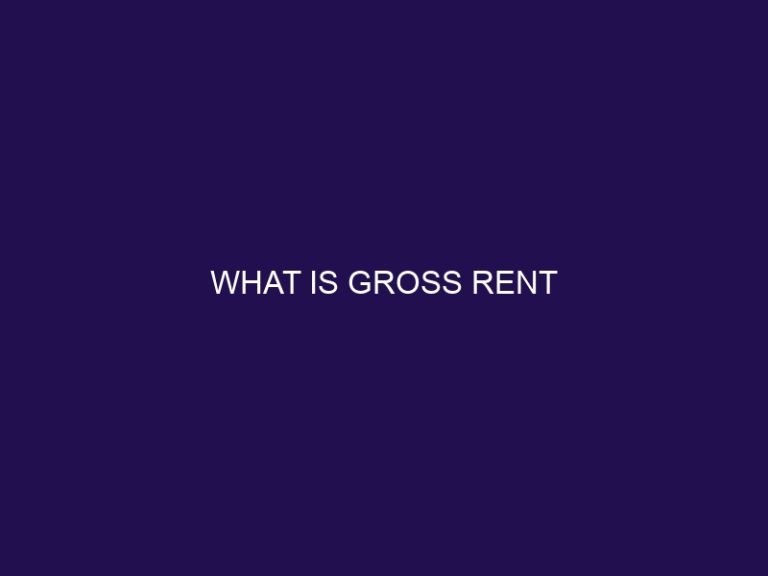What is a Landlord
A landlord is an individual or entity who owns a property and allows another person or entity, known as the tenant, to occupy and use the property in exchange for payment. Being a landlord entails various responsibilities and roles in maintaining the property and managing the tenant-landlord relationship. According to the Census Bureau, approximately 36% of households in the United States are occupied by renters, highlighting the significance of the role of landlords in providing housing.
As a landlord, one must understand the definition and importance of their role, which includes:
- – Understanding the legal and financial obligations associated with property ownership and management.
- – Providing a safe and habitable living environment for tenants.
- – Collecting rent and managing lease agreements.
- – Addressing maintenance and repair issues promptly.
- – Resolving tenant disputes and ensuring compliance with landlord-tenant laws.
- – Maintaining proper financial records and managing expenses related to the property.
People become landlords for various reasons, such as investment opportunities and the potential for passive income generation. It offers individuals the chance to build wealth through real estate appreciation and rental income. However, being a successful landlord requires specific qualities such as effective communication skills, knowledge of landlord-tenant laws, and financial management skills.
While being a landlord can be rewarding, it also comes with its fair share of challenges. Tenant issues and disputes, property maintenance and repairs, and legal and regulatory compliance can pose significant challenges for landlords.
To be a successful landlord, it is crucial to implement a thorough tenant screening process, effectively manage the property, and maintain good relationships with tenants. By doing so, landlords can create a positive and harmonious rental experience for both themselves and their tenants.
Definition of a Landlord
A landlord, as per the definition, can be considered as an individual or entity who owns a property and rents it out to tenants in exchange for payment, usually in the form of monthly rent.
When it comes to the responsibilities of a landlord, they typically include maintaining the property, collecting rent, and addressing any issues or repairs that may arise.
Additionally, a landlord has the authority to enforce the terms of the rental agreement and may choose to evict tenants who violate those terms.
It is crucial for both landlords and tenants to understand their rights and obligations as outlined in the rental agreement.
Suggestions for landlords include maintaining good communication with tenants, promptly addressing maintenance concerns, and keeping up with local rental laws.
What Does it Mean to be a Landlord?
Being a landlord means taking on the role of a property owner and renting out that property to tenants. It involves a variety of responsibilities, such as finding and screening tenants, collecting rent, handling maintenance and repairs, and ensuring legal compliance. A good landlord possesses effective communication skills, a strong knowledge of landlord-tenant laws, and financial management skills. Common challenges faced by landlords include dealing with tenant issues and disputes, property maintenance and repairs, and legal and regulatory compliance. To be a successful landlord, it is important to have a thorough tenant screening process, effective property management, and maintain good relationships with tenants.
What Does it Mean to be a Landlord? Here’s a true story: Emily became a landlord after inheriting her childhood home. She quickly realized that being a landlord meant not only managing the property, but also handling unexpected repairs and dealing with tenant disputes. With time, she learned how to communicate effectively with her tenants and established a reliable network of maintenance professionals. Emily also prioritized regular property inspections and stayed up-to-date with changing landlord-tenant laws. Through these experiences, she cultivated valuable skills and became a successful landlord, providing a safe and comfortable living environment for her tenants.
Roles and Responsibilities of a Landlord
Roles and Responsibilities of a Landlord
Being a landlord comes with specific roles and responsibilities that are vital for successful property management.
|
Why Do People Become Landlords?
Becoming a landlord: Have you ever wondered why some individuals choose to venture into the world of real estate? Let’s dive into the reasons behind this popular career choice. Explore the lucrative investment opportunities and the allure of passive income generation that drive people to take on the role of a landlord. Discover how these factors intertwine to create a compelling narrative for those seeking financial security and long-term wealth building. Get ready to uncover the motivations behind the decision to become a landlord!
Investment Opportunities
Investment Opportunities in rental properties offer various chances for individuals looking to build their wealth. Here are some opportunities for investment in becoming a landlord:
| 1. Rental Income: | Owning a property can provide a steady monthly cash flow through rental payments. |
| 2. Property Appreciation: | Real estate values tend to increase over time, allowing landlords to build equity and potentially sell for a profit. |
| 3. Tax Benefits: | Landlords can take advantage of tax deductions on property expenses such as mortgage interest, property taxes, and maintenance costs. |
| 4. Diversification: | Real estate investments can diversify an individual’s investment portfolio, reducing risk. |
| 5. Leverage: | Investors can use a mortgage to finance their property purchase, allowing them to control a valuable asset with a relatively small upfront investment. |
Fact: Real estate has historically been a reliable long-term investment, with steady returns and less volatility compared to other investment options.
Passive Income Generation
Passive income generation is the primary goal for many individuals who decide to become landlords. It provides a stable and consistent stream of income with very little effort required. If you are interested in achieving passive income through rental properties, consider the following strategies:
- Invest in High-Demand Locations: When selecting properties, focus on areas with a high demand for rentals. This ensures a continuous flow of tenants, thereby securing your passive income.
- Outsource Property Management: To ease your workload, consider hiring a professional property management company. They can handle various tasks like tenant screening, rent collection, and property maintenance, allowing you to have more free time.
- Long-Term Leases: Encourage your tenants to sign longer lease agreements. This reduces turnover, providing a stable income stream and maximizing your passive income.
- Regular Rent Increases: Gradually increase the rent over time to stay in line with market rates and boost your profits. This will contribute to a higher passive income in the long run.
- Invest in Appreciating Assets: Choose properties in locations where property values are expected to appreciate. By doing so, you can generate passive income through both rental yield and property appreciation.
By implementing these strategies, you can maximize your passive income while minimizing your involvement in day-to-day operations as a landlord.
Qualities of a Good Landlord
When it comes to being a good landlord, certain qualities make all the difference. From effective communication skills to a solid understanding of landlord-tenant laws and financial management, these crucial aspects define what it takes to be exceptional in the world of property management. So, if you’re eager to discover what sets a good landlord apart from the rest, hang tight as we delve into the fascinating realm of landlord qualities.
Effective Communication Skills
Effective communication skills are crucial for landlords to maintain a positive and productive relationship with their tenants. Clear and concise communication helps landlords effectively convey expectations, rules, and policies. Active listening skills enable landlords to promptly address and understand tenant concerns efficiently. Being responsive and timely in communication demonstrates to tenants that their needs and concerns are valued. Furthermore, good communication involves being respectful, professional, and empathetic in all interactions with tenants. Foster transparency and trust by regularly updating tenants on important information such as maintenance schedules or policy changes. By cultivating effective communication skills, landlords can create a harmonious living environment for their tenants while efficiently managing and maintaining their properties.
Knowledge of Landlord-Tenant Laws
A fundamental aspect of being a proficient landlord is possessing knowledge of landlord-tenant laws. Acquiring an understanding of these regulations empowers landlords to fulfill their legal obligations and safeguard their interests. By being well-informed of rental regulations, eviction procedures, and tenant rights, landlords can adeptly navigate any potential legal issues. This knowledge also enables landlords to ensure fair and lawful practices, thereby creating a secure and comfortable living environment for tenants. Keeping abreast of changes in landlord-tenant laws is imperative for landlords to maintain compliance and steer clear of any legal consequences. Exhibiting knowledge of these laws showcases professionalism and responsibility in the management of rental properties.
Financial Management Skills
Financial Management Skills for Landlords: Maximizing Profits in Rental Properties
Financial management skills are essential for landlords to effectively handle their rental properties and maximize their profits. By cultivating these skills, landlords can navigate the financial aspects of property ownership and ensure long-term success in their rental business.
Here are some key skills that are crucial for successful financial management:
- Budgeting: Setting a budget is vital as it helps landlords track income and expenses, plan for repairs and maintenance, and identify potential cost-saving opportunities.
- Accounting: Proper bookkeeping ensures accurate record-keeping of rental income, expenses, and tax deductions. It also helps landlords monitor cash flow and financial performance.
- Financial Analysis: Evaluating rental property investments and conducting regular financial assessments enable landlords to make informed decisions, identify areas for improvement, and optimize rental rates.
- Debt Management: Effectively managing mortgage payments and other debts associated with the property is crucial for landlords to maintain positive cash flow and preserve profitability.
- Tax Planning: Being aware of applicable tax laws and deductions allows landlords to minimize their tax liability and maximize their returns.
Common Challenges Faced by Landlords
Being a landlord comes with its fair share of challenges. In this section, we’ll dig into the common struggles that landlords often encounter. From tenant issues and disputes to property maintenance and repairs, and dealing with legal and regulatory compliance, we’ll uncover the hurdles that landlords navigate on a regular basis. Get ready to explore the nitty-gritty of the landlord life and gain insights into the complexities of this role.
Tenant Issues and Disputes
Tenant Issues and Disputes are a frequent occurrence for landlords, posing significant challenges. Managing these problems effectively is crucial for maintaining a positive relationship with tenants. To handle such issues, landlords should consider the following steps:
| Promote Open Communication | Engage in Respectful Mediation | Maintain Clear Documentation | Acquire sufficient Legal Knowledge |
|---|---|---|---|
|
By encouraging tenants to promptly express their concerns and providing a designated channel for issue reporting. |
When conflicts arise, attentively listening to both parties and facilitating a fair and satisfactory resolution. |
Of all interactions and agreements with tenants to ensure transparency and accountability. |
Of local landlord-tenant laws to fully comprehend rights and responsibilities. |
Remember, promptly and fairly addressing tenant issues contributes to a harmonious and fruitful landlord-tenant relationship.
Fact: A survey revealed that unpaid rent and property damage are the most commonly reported tenant issues by landlords.
Property Maintenance and Repairs
Property maintenance and repairs are crucial responsibilities for landlords to ensure the safety and comfort of their tenants. Here are some key points to consider:
- Regular Inspections: Conduct routine inspections to identify any maintenance issues or repairs that need to be addressed.
- Prompt Response: Respond quickly to tenant reports of property maintenance and repair issues to prevent further damage and maintain tenant satisfaction.
- Qualified Contractors: Hire reliable and skilled contractors or maintenance staff to handle property maintenance and repairs efficiently and effectively.
- Preventive Maintenance: Implement a preventive maintenance plan to address potential property maintenance and repair problems before they escalate.
- Budgeting: Set aside a portion of rental income for property maintenance and repairs to handle unexpected expenses.
By prioritizing property maintenance and repairs, landlords can create a safe and enjoyable living environment for tenants while preserving the value of their investment.
Legal and Regulatory Compliance
Legal and regulatory compliance play a crucial role in the life of a landlord. It is imperative to abide by the laws and regulations to protect both the landlord and the tenants. This article outlines the significant areas where landlords need to ensure legal and regulatory compliance:
| 1. Tenant Screening: | Landlords must conduct thorough background checks to comply with fair housing laws and avoid any form of discrimination. |
| 2. Lease Agreements: | It is essential to create legally binding lease agreements that clearly state the terms and conditions of the tenancy. |
| 3. Security Deposits: | Landlords should strictly adhere to laws concerning the collection, handling, and refunding of security deposits. |
| 4. Maintenance and Repairs: | Landlords hold the responsibility of maintaining the property in compliance with safety and habitability standards. |
| 5. Evictions: | When it comes to evicting tenants, landlords must follow legal procedures, which include providing proper notice and going through the court process. |
| 6. Privacy: | Tenant privacy rights must be respected, and landlords should obtain proper consent before entering the rental property. |
By giving utmost importance to legal and regulatory compliance, landlords can establish a smooth and lawful relationship with their tenants.
Tips for Being a Successful Landlord
Being a successful landlord is no easy task, but with the right tips and strategies, you can ensure a smooth and profitable journey. In this section, we’ll dive into the essential aspects of being a successful landlord. From conducting a thorough tenant screening process to effective property management and maintaining good relationships with tenants, we’ll uncover key insights and practices to help you excel in your role as a landlord. So, let’s explore these valuable tips and set the foundation for your success in the rental property market!
Thorough Tenant Screening Process
To ensure a thorough tenant screening process, it is important to follow these steps:
- Application process: Begin by requesting completed application forms that include personal and employment information.
- Background checks: Conduct comprehensive background checks to verify the applicant’s identity, criminal history, and creditworthiness.
- Reference checks: Take the time to contact previous landlords and references to gather valuable insights into the applicant’s rental history and behavior.
- Income verification: To ensure the applicant can afford the rent, carefully verify their income through pay stubs, employment contracts, or tax returns.
- Interview: Engage in a face-to-face meeting or conduct a thorough phone interview to assess the applicant’s compatibility and communication skills.
- Review rental history: Evaluate the applicant’s past rental history, paying close attention to any red flags or evictions that may raise concerns.
- Tenant screening services: Consider utilizing professional tenant screening services to gather additional information and insights.
- Legal compliance: Finally, it is crucial to ensure that your tenant screening process complies with all applicable laws to avoid any form of discrimination or privacy breaches.
Effective Property Management
Effective property management is crucial for landlords to ensure the smooth operation and maintenance of their rental properties. Achieving effective property management involves several key steps.
1. Regular Property Inspections: Implementing routine inspections is important to identify any maintenance or repair needs promptly and address them timely.
2. Timely Rent Collection: It is essential to establish a clear and consistent rent collection process to ensure that tenants make their payments on time.
3. Efficient Tenant Communication: Maintaining open lines of communication with tenants is vital to promptly address their concerns and resolve any issues they may have.
4. Proper Documentation: Keeping thorough records of lease agreements, maintenance requests, and communication with tenants is necessary for legal and financial purposes.
5. Proactive Maintenance: Regularly maintaining and repairing the property is crucial to prevent major issues and ensure tenant satisfaction.
6. Tenant Screening: Performing thorough background checks and screenings is necessary to select reliable and responsible tenants.
7. Understanding Regulations: Staying updated on local laws and regulations related to rental properties is essential to ensure compliance.
8. Financial Management: Maintaining organized financial records and budgeting appropriately for expenses and potential vacancies is crucial.
9. Ongoing Learning: Staying informed about industry trends, best practices, and legal obligations is necessary to continuously improve property management skills.
By following these steps, landlords can effectively manage their properties, ensure tenant satisfaction, and maximize their return on investment.
Maintaining Good Relationships with Tenants
Maintaining good relationships with tenants is crucial for a successful landlord-tenant dynamic. Here are some steps to achieve this:
- Communicate regularly: Respond promptly to tenants’ queries and concerns and keep them informed about any changes or updates.
- Respect boundaries: Give tenants privacy and address their needs without intruding unnecessarily.
- Be fair and consistent: Apply rules and policies consistently to all tenants to avoid any perception of favoritism or discrimination.
- Address maintenance concerns promptly: Timely repairs and maintenance show tenants that their comfort and well-being matter to you.
- Show appreciation: Recognize and reward good tenants with gestures like small gifts or holiday greetings.
True story: A landlord in my neighborhood built a positive relationship with his long-term tenants by regularly hosting community events and helping them find local services. As a result, his tenants stayed for many years, spreading positive word-of-mouth and attracting new tenants to his properties.
Frequently Asked Questions
What is a landlord?
A landlord is the owner of a property that is leased or rented to a tenant. They transfer part of their interest in the property to the tenant through a lease contract, allowing the tenant to occupy and use the property.
What are some responsibilities of a landlord?
Being a landlord involves various responsibilities, including budgeting for property expenses such as taxes and maintenance costs, drafting legally binding lease agreements, maintaining the property for safety and functionality, conducting tenant screenings, and understanding landlord-tenant law to avoid legal conflicts.
Can a landlord enter the rental property without the tenant’s permission?
No, once the lease is signed, the landlord cannot enter the property without the tenant’s permission, even if specified in the lease contract. Adequate notice must be given before entry.
What happens at the end of a lease period?
At the end of the lease period, the landlord retains ownership of the property and has the option to extend the lease, find a new tenant, or stop leasing the property.
What can a landlord do if a tenant refuses to leave after the lease ends or fails to pay rent on time?
If a tenant refuses to leave after the lease ends or fails to pay rent on time, the landlord has the power to evict them in accordance with landlord-tenant laws.
Do landlord-tenant laws differ from state to state?
Yes, landlord-tenant laws vary by state. It is important for landlords to familiarize themselves with their state’s specific laws and also abide by fair housing laws to avoid legal conflicts.







